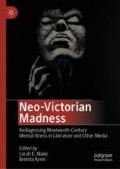Abstract
Margaret Atwood’s Alias Grace (1997), a neo-Victorian classic biofictional novel about a nineteenth-century murderess, is interpreted in this chapter as a narrative of a madwoman, that is, a narrative which undercuts a possibility of a coherent representation of the self. Her “inability to speak”—fragmentation, instability and incompleteness of her narrative—is what makes it queer; its queerness is based in its refusal to be within the doctor-listener’s/reader’s grasp. Grace’s (mad) story, via its narrative “failure” to offer a linear, coherent account, becomes the epitome of queer subversiveness. The chapter also discusses the television adaptation of Atwood’s novel to examine alternative techniques used in the adaptive medium to express the instabilities and the incoherence of the self, and to diagnose Grace Marks of the television show as a (queer) madwoman.
Access this chapter
Tax calculation will be finalised at checkout
Purchases are for personal use only
Bibliography
Atwood, Margaret. Alias Grace. 1996. London: Virago, 1997.
———. “In Search of Alias Grace: On Writing Canadian Historical Fiction.” American Historical Review 103, no. 5 (1998): 1503–16.
Baym, Nina. “The Madwoman and Her Languages: Why I Don’t Do Feminist Literary Theory.” In Feminisms: An Anthology of Literary Theory and Criticism, edited by Robyn R. Warhol and Diane Price Herndl, 154–67. New Brunswick, NJ: Rutgers University Press, 1991.
Butler, Judith. “Imitation and Gender Insubordination.” 1991. In Lesbian and Gay Studies Reader, edited by Henry Abelove, Michele Aina Barale, and David M. Halperin, 307–20. New York: Routledge, 1993.
———. Gender Trouble: Feminism and the Subversion of Identity. 1990. London and New York: Routledge, 1997.
Caminero-Santangelo, Marta. The Madwoman Can’t Speak, or Why Insanity Is Not Subversive. Ithaca, NY: Cornell University Press, 1998.
Case, Sue-Ellen. “Tracking the Vampire.” Differences 3, no. 2 (1991): 1–20.
Costa, Lucy. “Mad Studies—What It Is and Why You Should Care.” Mad Studies Network. 2014. https://madstudies2014.wordpress.com/2014/10/15/mad-studies-what-it-is-and-why-you-should-care–2/.
Darroch, Heidi. “Hysteria and Traumatic Testimony: Margaret Atwood’s Alias Grace.” Essays on Canadian Writing 81 (2004): 103–21.
Davies, Helen. Gender and Ventriloquism in Victorian and Neo-Victorian Fiction: Passionate Puppets. Basingstoke: Palgrave Macmillan, 2012.
de Certeau, Michel. The Writing of History. 1975. Translated by Tom Conley. New York: Columbia University Press, 1988.
Felman, Shoshana. “Women and Madness: The Critical Phallacy.” Diacritics 5, no. 4 (1975): 2–10.
Foucault, Michel. History of Madness. 1961. Edited by Jean Khalfa. Translated by Jonathan Murphy and Jean Khalfa. London: Routledge, 2006.
Freccero, Carla. “Queer Spectrality: Haunting the Past.” In A Companion to Lesbian, Gay, Bisexual, Transgender and Queer Studies, edited by George E. Haggerty and Molly McGarry, 194–213. Oxford: Blackwell, 2007.
Gilbert, Sandra M., and Susan Gubar. The Madwoman in the Attic: The Woman Writer and the Nineteenth-Century Literary Imagination. 1979. New Haven: Yale University Press, 2000.
Halberstam, Jack. The Queer Art of Failure. Durham, NC: Duke University Press, 2011.
———. Gaga Feminism: Sex, Gender and the End of Normal. Boston, MA: Beacon Press, 2012.
Hall, Donald E. Queer Theories. Basingstoke: Palgrave Macmillan, 2003.
Halperin, David M. Saint Foucault: Towards a Gay Hagiography. New York: Oxford University Press, 1995.
Howells, Carol Ann. Contemporary Canadian Women’s Fiction. New York: Palgrave Macmillan, 2003.
Huffer, Lynne. Mad for Foucault: Rethinking the Foundations of Queer Theory, New York: Columbia University Press, 2009.
Katharine Harris. “‘Part of the Project of That Book Was Not to Be Authentic’: Neo-Historical Authenticity and Its Anachronisms in Contemporary Historical Fiction.” Rethinking History 21, no. 2 (2017): 193–212.
King, Jeanette. The Victorian Woman Question in Contemporary Feminist Fiction. Basingstoke: Palgrave Macmillan, 2005.
Knelman, Judith. “Can We Believe What the Newspapers Tell Us? Missing Links in Alias Grace.” University of Toronto Quarterly 68, no. 2 (1999): 677–86.
Kosofsky Sedgwick, Eve. Tendencies. London: Routledge, 1994.
Martin, Kevin H. “Beauty and Ambiguity in ‘Alias Grace’: Varying Visual Styles, One True Crime Story.” Creative Planet Network. 2017. https://www.creativeplanetnetwork.com/news/news-features/beauty-and-ambiguity-alias-grace-varying-visual-styles-one-true-crime-story–636423.
Morra, Linda. 1999. “Articulating Madness: The Foucauldian Notion of Madness and Margaret Atwood’s Alias Grace.” The West-Virginia Philological Papers 45: 123–29.
Polley, Sarah. Alias Grace. Episode 3. Directed by Mary Harron. CBS. October 9, 2017.
———. Episode 6. Directed by Mary Harron. CBS. October 16, 2017.
Reilly, Phoebe. “Alias Grace: How a True-Crime Drama Became the Most Relevant Show on TV.” Rolling Stone. 2017. https://www.rollingstone.com/tv/tv-features/alias-grace-how-a-true-crime-drama-became-the-most-relevant-show-on-tv–127693/.
Rosenhan, D. L. “On Being Sane in Insane Places.” Science 179 (1973): 250–58.
Scull, Andrew. Madness in Civilization. A Cultural History of Insanity from the Bible to Freud, from the Madhouse to Modern Medicine. Princeton: Princeton University Press, 2015.
Showalter, Elaine. The Female Malady: Women, Madness and English Culture, 1830–1980. 1985. London: Virago, 1987.
Spandler, Helen, and Meg-John Barker. “Mad and Queer Studies: Interconnections and Tensions.” Mad Studies Network. 2016. https://madstudies2014.wordpress.com/2016/07/01/mad-and-queer-studies-interconnections-and-tensions/.
Stallybrass, Peter, and Allon White. The Politics and Poetics of Transgression. Ithaca, NY: Cornell University Press, 1986.
Stanley, Sandra Kumamoto. “The Eroticism of Class and the Enigma of Margaret Atwood’s Alias Grace.” Tulsa Studies in Women’s Literature 22, no. 2 (2003): 371–86.
Talairach-Vielmas, Laurence. “Madwomen in the Attic.” In Women and the Gothic: An Edinburgh Companion, edited by Avril Horner and Sue Zlosnik, 31–45. Edinburgh: Edinburgh University Press, 2016.
Ussher, Jane M. Women’s Madness: Misogyny or Mental Illness? Hemel Hampstead: Harvester Wheatsheaf, 1991.
———. The Madness of Women: Myth and Experience. London: Routledge, 2011.
VanArendonk, Kathryn. “How Does Netflix’s Alias Grace Compare to Margaret Atwood’s Book?” Vulture. 2017a. https://www.vulture.com/2017/11/netflix-alias-grace-margaret-atwood-book-comparison.html.
———. “Let’s Talk About the Ending of Alias Grace.” Vulture. 2017b. https://www.vulture.com/2017/11/alias-grace-lets-talk-about-the-ending.html.
Warner, Michael. Fear of a Queer Planet: Queer Politics and Social Theory. Minneapolis: University of Minnesota Press, 1993.
Author information
Authors and Affiliations
Editor information
Editors and Affiliations
Rights and permissions
Copyright information
© 2020 The Author(s)
About this chapter
Cite this chapter
Braid, B. (2020). Queering the Madwoman: A Mad/Queer Narrative in Margaret Atwood’s Alias Grace and Its Adaptation. In: Maier, S., Ayres, B. (eds) Neo-Victorian Madness. Palgrave Macmillan, Cham. https://doi.org/10.1007/978-3-030-46582-7_9
Download citation
DOI: https://doi.org/10.1007/978-3-030-46582-7_9
Published:
Publisher Name: Palgrave Macmillan, Cham
Print ISBN: 978-3-030-46581-0
Online ISBN: 978-3-030-46582-7
eBook Packages: Literature, Cultural and Media StudiesLiterature, Cultural and Media Studies (R0)

